Search the Special Collections and Archives Portal
Search Results

Transcript of interview with Myra Berkovits by Barbara Tabach, August 21, 2014
Date
Archival Collection
Description
Interview with Myra Berkovits by Barbara Tabach on August 21, 2014. In this interview, Berkovits talks about growing up and starting her teaching career in Chicago. When she moves to Las Vegas, Berkovits eventually purchases a dining concierge business, but returned to teaching, and is now involved with the Sperling Kronberg Mack Holocaust Resource Center.
Myra Berkovits was born Myra Mosse in 1944 in Chicago, Illinois. She became an elementary school teacher in Chicago before moving to Las Vegas in 1980. Myra has made contributions to Las Vegas in the public and private sectors. She owned several businesses then returned to teaching, heading to the University of Nevada, Las Vegas (UNLV) to renew her teaching license and later received her master's degree. After a year of teaching in multicultural education, Myra was then in charge of the school district's homeless program, seeing its growth from serving 1,200 to 6,000 students. Myra's other passion was for Holocaust education and she became one of six interviewers in the city for the Shoah Foundation, documenting survivors' stories. One interviewee, David Berkovits, would later become her husband of fifteen years. Myra's own Holocaust education was aided by powerful trips to Israel and Poland. She used these experiences to develop and lead student-teacher conferences and classroom curriculum for the whole state. Myra still serves at the Education Specialist at the Holocaust Resource Center.
Text
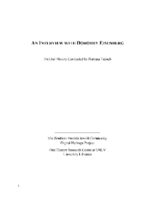
Transcript of interview with Dorothy Eisenberg by Barbara Tabach, October 23, 2014
Date
Archival Collection
Description
Interview with Dorothy Eisenberg by Barbara Tabach on October 23, 2014. In this interview, Eisenberg discusses her upbringing on the east coast and becoming a widow with four children. She met her second husband at a synagogue, and they moved to Las Vegas for a fresh start. Eisenberg became involved with Temple Beth Sholom, and the Las Vegas League of Women Voters. She has a school named after her in the Clark County School District.
Dorothy Eisenberg is a first generation American, with roots in Ukraine and Central Europe, and grew up in Philadelphia. Judaism was a significant part of Dorothy's life from the beginning, and both her and her brother spent many of their afternoons at Hebrew school and most weekends at Shabbat services as adolescents. Eisenberg moved to Las Vegas with her children and second husband in 1964. She became an influential member of the community and served as the Jewish Federation of Las Vegas's first female president. She was also actively involved in the League of Women Voters of Las Vegas Valley, including leading the organization's advocacy for school desegregation and serving as its president for two years.
Text

Transcript of interview with Jerry Fox by Barbara Tabach, November 12, 2014
Date
Archival Collection
Description
Interview with Jerry Fox by Barbara Tabach on November 12, 2014. In this interview, Fox discusses his father's restaurant, Foxy's Delicatessen, which opened on the Las Vegas Strip in the 1950s, and his own business endeavors including the Tinder Box and an embroidery business.
Jerry Fox grew up in Los Angeles until his family moved to Las Vegas in February 1955, where his father opened Foxy's Delicatessen, the city's first Jewish deli. Jerry would go on to follow in his father's entrepreneurial footsteps, operating several ventures across different industries, including his own restaurant, Foxy Dog. Jerry sold Foxy Dog in 1975 after going through a divorce, the same year that Foxy's Deli closed.
Text
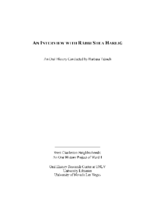
Transcript of interview with Rabbi Shea Harlig by Barbara Tabach, March 5, 2014
Date
Archival Collection
Description
Interview with Rabbi Shea Harlig by Barbara Tabach on March 5, 2014. In this interview, Rabbi Harlig discusses the Chabad movement of Orthodox Judaism and establishment of Chabad centers in Las Vegas and Southern Nevada. Rabbi Harlig talks about the property he has acquired for Chabad, and its outreach programs, including supervision of kosher kitchens in hotels. This interview was conducted for the Ward 1: West Charleston Neighborhoods oral history project, and therefore includes zoning and neighborhood discrimination issues, and a tour of the property.
Rabbi Shea Harlig arrived in Las Vegas in 1990 and settled in the Artesian Heights neighborhood of Las Vegas. As Director of Chabad of Southern Nevada, Rabbi Harlig focuses on religious outreach, education and social services, and has helped establish seven Chabad locations throughout the community and also built a school and educational program of the highest standards.
Text

Transcript of interview with Margo Mink Colbert by Barbara Tabach, November 11, 2014
Date
Archival Collection
Description
Interview with Margo Mink Colbert by Barbara Tabach on November 11, 2014. Colbert discusses her upbringing in New York and her schooling at the High School of Performing Arts and Julliard. She is a choreographer and faculty member at the University of Nevada Las Vegas.
Margot Mink Colbert was born in 1935 in New York City, to parents of different economic backgrounds who shared a Jewish immigrant heritage. She attended Julliard and studied under modern dance pioneers like Martha Graham and Jose Limon. Margot honed her skill for choreography, and took her first job in academia as a Senior Lecturer in the dance department at the University of Wisconsin-Madison. In 1991, she moved to the University of Nevada, Las Vegas to take a one-year appointment as an instructor. A year later, she was hired into a tenure track position. Margot is now a Professor at the University of Nevada-Las Vegas, assistant chairperson of and Director of Ballet in its Department of Dance. In addition, she continues to direct Ballet Mink, a dance company she founded in 1970.
Text
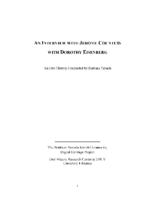
Transcript of interview with Jerome Countess and Dorothy Eisenberg by Barbara Tabach, October 28, 2014
Date
Archival Collection
Description
Interview with Jerry Countess and Dorothy Eisenberg by Barbara Tabach on October 28, 2014. Countess discusses his childhood and military life. He became involved in the United Jewish Appeal in Las Vegas and started the Jewish Reporter newspaper. Dorothy Eisenberg is also involved in the interview to discuss the Jewish Federation and the Jewish community.
Jerome Countess, known as Jerry to most, was born on December 22, 1920 in Brooklyn, New York. He grew up in the borough's Jewish neighborhood, and he developed a reputation for being a skillful handball player and a great dancer. Though he was not allowed to enlist in the U.S. Coast Guard due to colorblindness, Jerry was eventually drafted into the army during World War II. With very minimal combat training, Jerry was sent to North Africa as an infantryman, and was later stationed in Italy. After three years of service, Jerry returned home and married his childhood sweetheart, Rachel, in 1945. Using the G.I. Bill, he enrolled at New York University to study writing, though he quit just shy of graduation as his wife was expecting. After briefly working in the television broadcasting industry, Jerry landed a job with the United Jewish Appeal. In 1975, following in his desire to move west, Jerry took the job of executive director of the Combined Jewish Appeal in Las Vegas, what would soon be renamed the Jewish Federation of Las Vegas. Under his leadership, the federation started the Jewish Family Service as well as The Jewish Reporter, a monthly publication to promote engagement of the Jewish community. Jerry served as the executive director of the federation for many years, serving at the pleasure of many board members and presidents, including the first female federation president, Dorothy Eisenberg.
Text

Transcript of interview with Gil Cohen by Claytee White, August 5, 2014
Date
Archival Collection
Description
Interview with Gil Cohen by Claytee White on August 5, 2015. In this interview, Cohen discusses growing up in Las Vegas and attending University of Nevada at Reno. He returned to Las Vegas to join the management training program at the Stardust. He talks about his friendships with Moe Dalitz and Carl Cohen, and his interest in golfing. He also discusses corporate ownership of casinos, unions, and his experiences working at different Strip hotels.
Gil Cohen came to Las Vegas in 1957, when was ten years old, when his father, Yale Cohen, was recruited by Moe Dalitz to work at the Stardust Hotel and Casino. Cohen graduated from University of Nevada Reno, and started working at the Stardust through the management-training program. In 1975, he was made hotel manager, his first of many leadership positions in Strip properties, which have included the Dunes, Aladdin, Hacienda and Monte Carlo, where he currently works as a casino host.
Text
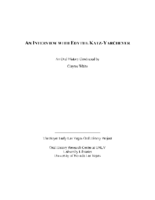
Transcript of interviews with Edythe Katz-Yarchever by Claytee White, 2000-2005
Date
Archival Collection
Description
Transcript of interviews with Edythe Katz-Yarchever by Claytee White over the course of several sessions in 2000, 2003 and 2005. In the interviews, Katz-Yarchever discusses her life in Las Vegas, owning theaters with her husband, Lloyd Katz, and the strides they made in civil rights. She talks about her service in Civil Defense and the National Guard, and moving to various places, then working in California and meeting her husband, Lloyd. The Katzes became involved in the community in various ways with Operation Independence and Holocaust education. About a decade after Lloyd's death, Edythe married Judge Gilbert Yarchever.
Edythe Katz-Yarvhever was born in Boston, a second generation American whose grandparents left Russia the century before. Edythe completed finishing school at the start of World War II and worked various jobs at home before joining the Civil Defense, and later, the National Guard. She moved to Maryland and got a job as a secretary at Edgewood Arsenal, then transferred to Cushing General Hospital to assist a Marine Corps neurologist, who was also a Jewish refugee. Towards the end of the war, she is transferred to an Army hospital in Hawaii, and thus began the rest of her life on the West Coast. When the war ended, Edythe sailed to California and worked various jobs in Los Angeles: in the secretarial pool at MGM Studios, for a casting agency and for a hotel magazine. Edythe met Lloyd Katz in San Francisco, and the two were married after a short courtship. The couple lived in San Francisco before moving to Las Vegas in 1951, where they took over the management of the Huntridge, Palace and Fremont theaters, then leased by Edythe's parents. The Katzes took a stand to desegregate their theaters, allowing black customers to sit with white patrons. Edythe and Lloyd became active in the city's Civil Rights Movement, including work with Operation Independence and the NAACP. Edythe started organizations like Volunteers for Education and Junior Art League, and directed an interfaith, interracial preschool. Lloyd would frequently open up their theaters to organizations to hold fundraisers, free-of-charge. Edythe was extremely active in the local Jewish community, including opening the city's first Jewish gift shop, serving as sisterhood president at her synagogue and starting the Jewish Reporter. She later founded a library for Holocaust education as well as assisted the school district's development of curriculum and teacher training relating to the Holocaust. Lloyd Katz passed away in 1986, and in 1995, Edythe married Gilbert Yarchever. Edythe and Lloyd's community service work was honored with the naming of their school, the Edythe and Lloyd Katz Elementary School, where Edythe still remains active.
Text
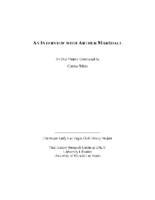
Transcript of interview with Arthur "Art" Marshall by Claytee D. White, February 11, 2014
Date
Archival Collection
Description
Interview with Arthur "Art" Marshall by Claytee White on February 11, 2014. In this interview, Marshall
Arthur Marshall was born in 1929 in Cleveland, Ohio. He met his wife, Jayn in 1953, and the couple moved to Las Vegas where she already lived with her family. Art joined his father-in-law in the family's retail clothing business. Art Marshall took over the retail clothing business with his brother-in-law, Herb Rousso, and expanded operations as Marshall-Rousso stores. Art quickly became very active in the Jewish community upon arriving in Las Vegas. He served as president at Temple Beth Sholom, and worked with other Jews in the city, many who owned and managed the hotels at the time, to build a strong Jewish community in Las Vegas. He served as the chairman of Nevada State Bank and spent 12 years on the Nevada Gaming Commission.
Text

Transcript of interview with Jean Tobman, Marilyn Moran and Janie Moore by Claytee D. White, November 5, 2013
Date
Archival Collection
Description
Interview with Jean Tobman and two of her daughters, Marilyn (Tobman) Moran and Janie (Tobman) Moore by Claytee White, November 5, 2013. In this interview, Jean Tobman recalls coming to Las Vegas with her husband and two young children in the 1950s, and the life they established in the Pinto area of the Westside. Her husband, Herb, owned City Furniture and a cab company near downtown. Marilyn and Janie discuss their youth and the enjoyable time they had growing up in Las Vegas. Marilyn talks about how the city has grown and her time on the planning commission. Janie also discusses the growth of Las Vegas and her nostalgia for old Las Vegas.
In 1953, Jean and Herb Tobman moved from New Jersey to Las Vegas. The Tombans settled in the Pinto Palamino. Upon moving, Jean initially assisted her mother at her rooming house, and Herb worked with Jean's father at City Furniture. Herb bought his first cab soon thereafter, and grew one vehicle into Western Cab Company, which is still family-run. After a large fire closed City Furniture, Herb worked as the general manager at Moulin Rouge, jumpstarting his career in the gaming industry. Marilyn, Janie and Helen are the children of Jean and Herb and all still live in Las Vegas. The girls grew up keeping horses, as did many other neighbors in the Pinto area. Marilyn married John Moran, the sheriff's son, who served as a police officer himself. She sat on the planning commission for a decade, during the city's growth spurt. Janie spent a semester at Arizona State University before returning to Las Vegas to work at Stardust Hotel, a property co-owned by her father, who also served as the its president.
Text
